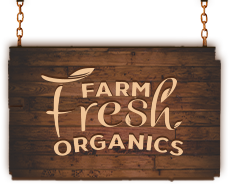The Power of Soil: Why Dirt Matters for Organic Produce
Monday, July 31st, 2023 | Farm Fresh
In the world of organic agriculture, there is a hidden secret that lies beneath the surface—the soil. While it may seem mundane and unremarkable, soil plays a pivotal role in producing exceptional organic produce. Understanding why dirt matters in organic farming can help us appreciate the true value of organic food and the impact it has on our health and the environment. In this blog post, we will explore the importance of soil in organic agriculture and how it contributes to the quality, nutrition, and sustainability of organic produce.
Nutrient-Rich Soil, Nutrient-Dense Produce
Organic farmers understand that healthy, nutrient-rich soil is the foundation for producing nutrient-dense organic produce. Unlike conventional farming, which relies on synthetic fertilizers, organic farming focuses on nourishing the soil naturally. Through practices such as composting, cover cropping, and crop rotation, organic farmers replenish the soil with essential nutrients, fostering a balanced ecosystem that promotes plant health and vitality.
The result is organic fruits and vegetables that are packed with vitamins, minerals, antioxidants, and phytonutrients, providing us with the vital nutrients our bodies need to thrive.
A Resilient Ecosystem
Organic soil is not just a medium for plants to grow; it’s a living ecosystem teeming with microscopic organisms that play critical roles in maintaining soil health. Beneficial bacteria, fungi, earthworms, and other soil-dwelling creatures work symbiotically to improve soil structure, enhance water retention, and protect plants from pests and diseases naturally.
These diverse soil organisms create a resilient and balanced ecosystem that reduces the need for chemical interventions, making organic produce healthier for both consumers and the environment.
Environmental Stewardship
Healthy organic soil is an essential ally in the fight against climate change. The carbon sequestration potential of organic farming is higher than that of conventional farming methods. The organic soil’s ability to store carbon helps reduce greenhouse gas emissions and contributes to mitigating the effects of climate change.
Moreover, organic farming practices minimize soil erosion, prevent water pollution, and promote biodiversity, making organic agriculture a sustainable and environmentally responsible choice.
Enhanced Flavor and Aroma
Have you ever noticed that organic fruits and vegetables often have a superior taste and aroma compared to their conventional counterparts? This is due to the organic soil’s ability to promote natural growth and optimize the plant’s expression of its unique flavor profile.
Organic produce is nurtured slowly, allowing the fruits and vegetables to develop their flavors fully. As a result, they burst with deliciousness, making every bite a delightful experience.
In Conclusion
In the world of organic farming, the soil is more than just dirt—it’s the cornerstone of a sustainable and healthy food system. The focus on nurturing the soil through organic practices translates into nutrient-dense, flavorful, and environmentally friendly produce. By supporting organic agriculture, we not only make a conscious choice for our well-being but also contribute to safeguarding the planet for future generations.
So, the next time you savor a juicy organic tomato or bite into a crisp organic apple, remember the power of soil and how it matters for our health, the environment, and the continued success of organic farming. Let’s celebrate the goodness that starts from the ground up—the goodness that begins with the miraculous world beneath our feet.
